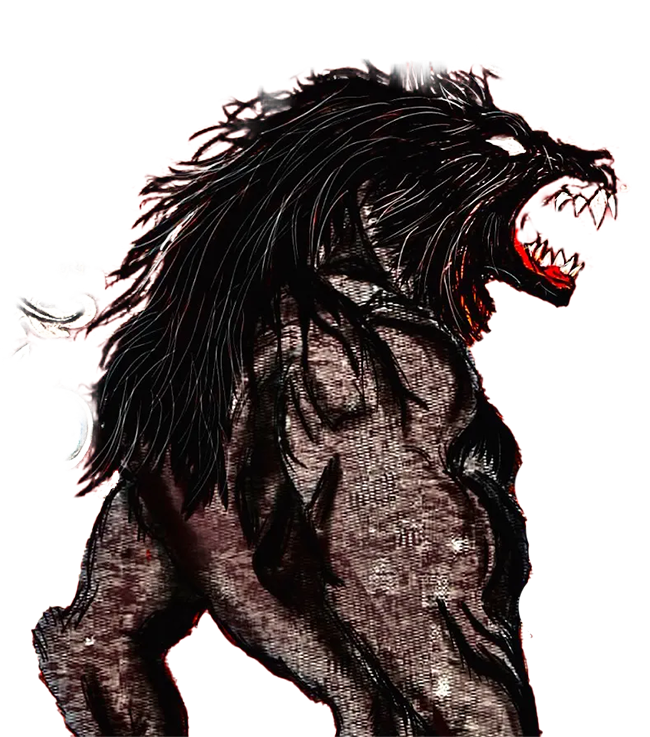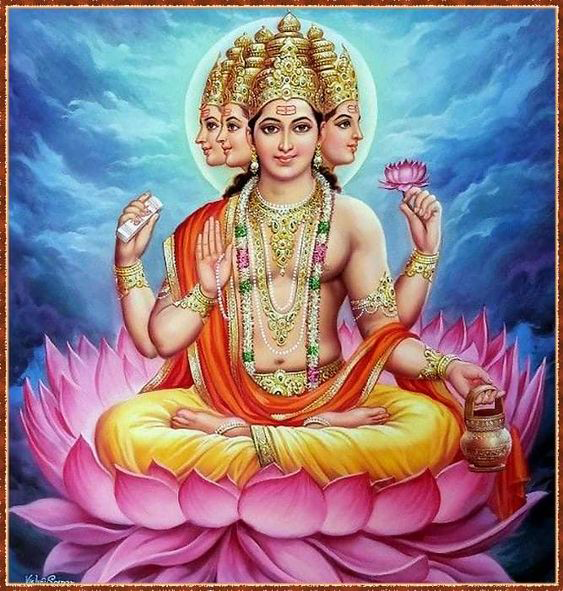Features
HOW THE GODS AND DEMONS LEARNED TO PLAY TOGETHER

by Ernest Macintyre
Derived from chapter one, six and seven of the Natyasashtra, on the origin of drama, and published in The Monkey King And Other Stories, Canada 1995 and in Scarless Face And Other Stories, India 2006.
The great god of the Hindus is Lord Brahma and in ancient times the great book of the Hindus made up of many parts was called the Vedas which told the Hindus about life, through artistic methods. India is a very large place, and people just moved across land from one place to another, meeting other, different kinds of people as they went. Lord Brahma and his Hindus who started in the North of India began moving to the South, carrying with them the great books of the Vedas. The people of Lord Brahma moved right across the whole of Southern India and into the country now called Sri Lanka, for in those days the narrow and shallow sea that divides Sri Lanka from India was all land.
In all these Southern parts that the Hindus had come to, there lived a great many tribes who behaved in different ways from the Hindus. The tribes of the Southern lands, in their own way, hunted, and gathered fruit. We know today that it is not true that the Egyptian people who built the great pyramids or the Sri Lankan people who built the wonderful tanks and temples of Anuradhapura or the Hindus of North India of the great Vedas were superior or better or more civilised than the tribal people .
They were not because we know today that civilised means to live happily with whatever you have in the land around you, and to please their demons whenever the tribal people needed help. But the Hindus did not see it that way. The Hindus thought they were more civilised, superior to the tribal people of the south.
And this story of ours began because God Indra, who worked under Lord Brahma, had been worried and angry for some time about strange noises coming from the direction of the forests where the tribal people of the southern lands lived. Not long after the sun had set he would hear, quite distinctly, long and piercing shrieks, the beating of drums, wailing, chanting and the stamping of feet. One night he decided to see for himself. Moving up silently to a large bush behind which he could hide, he peered through its leaves at the forest clearing beyond, and saw the tribal people behaving in a way that he had never seen before.
There was a woman seated on the ground looking very ill. About ten yards in front of her there were two pillars made of the trunks of banana trees and a third banana trunk was fixed to the top of the other two so that it looked like a kind of doorway. On both sides and on top of this doorway were tied great bundles of jungle leaves and branches so that you couldn’t see what was behind the floor. All the tribal people had come there and were standing on either side of the sick woman as well as behind her, but all of them were looking at the doorway made of banana trunks and jungle branches.
Between the woman and the doorway two men were leaping into the air as they danced with large flaming torches held in their hands. Another man sat close to the doorway beating a drum for the dancers. A fourth man, dressed in jungle leaves like all the others, moved about near the doorway shouting and singing something that Indra couldn’t understand. And then, all of a sudden, as this man shouted very loud, and the drum was beaten louder than ever and the dancers leapt in the air higher than ever, a terrible shriek was heard from behind the doorway.
Everyone stopped what they were doing. In the silence the shriek was heard again and through the door there leapt a huge and terrible looking demon with the head of a bear and the body of a human being. The man who had been chanting and singing shouted “Mahasona! Mahasona!” and hearing this Indra knew that the name of the demon was Mahasona.
Immediately the singing man asked the demon Mahasona:
“What do you want to make this woman well again?”
Mahasona replied, “I want a baby to take away, and I will make this woman well again.”
“No! No! A baby human cannot be given to you,” said the singing man, with great feeling.
“Then what will you give?” asked the demon Mahasona.
“I can give you a small chicken that is already dead,” said the man.
“Then give me the small chicken that is already dead,” agreed Mahasona the demon.
The singing man then walked up to a small basket lying on the ground close to where people were standing. From the basket he took up a little dead chicken. But as he held it up to show Mahasona the demon, Indra struck. Indra had been getting angrier and angrier as he watched these things that the tribal people were doing. Being a god of the Hindus, he thought that these things were evil and uncivilised.
Indra rushed forward with his famous staff. Indra always carried a tall staff and he used it on his enemies. He attacked the demon Mahasona who then ran back through the door to enter the jungle again. All the people and dancers started screaming and running in all directions. Inside the jungle Indra caught up with the demon Mahasona and gave him such a beating that he fell to the ground, screaming. But Indra did not stop there.
That night he went full speed through the whole jungle attacking and beating all the demons with his staff, hundreds of them. By morning all the demons had been well beaten and Indra’s victory over the demons became famous with all the Hindu gods and with the Lord of all gods, Brahma.
The next morning after Lord Brahma had eaten his breakfast he called up Indra to say thank you for his great defeat of the demons of the southern tribal lands. But the moment he saw Indra he knew that Indra was not fully happy with what had happened. Indra had a thoughtful look on his face. Brahma asked him, “What is the matter?”
Indra, speaking slowly, said, “We will never be able to live with these people happily simply by defeating their demons, because their demons belong to them. We must win the hearts and minds of the tribal people and their demons.”
“Yes, I know that,” said Brahma.
“But how do we win their hearts and minds?” asked Indra.
Brahma gave a deep sigh, waited a moment and then spoke.
“Ah, if only they could listen to our great Vedas. If they listened to our holy books they would surely give up their evil ways.” Brahma sighed again: “But these are Sudras, and you know that Sudras are not allowed to listen to the Vedas.
Because Brahma spoke slowly Indra had time to think while he was listening, and suddenly he got an idea from what Brahma was saying. Indra was very excited.
“Yes, Lord Brahma, but that rule is only for the Vedas that we now have!” Brahma looked curiously at Indra. “So what do you mean? “Indra spoke quickly. “If we make another, new Veda especially for the tribals, then they can learn our good ways from this new Veda! They are not allowed to listen only to the first great Vedas. They can listen to a new one.”
Brahma turned his head to look more closely at Indra. It looked as if Indra was right, for Brahma said a slow “Hmmm.” And then he asked, “But how do we do this? You see, Indra, we must know more about these tribals before we can make a new Veda for them. Now tell me, last night when you watched them from behind the bush, what were they doing?”
Indra then told Brahma all about the sick woman, the crowds around her looking at the doorway of banana trunks and jungle branches, the dancing men with torches in their hands, the music of the drum, the singing of the man who offered a little chicken to the demon Mahasona, the shrieking demon and how it suddenly entered from behind the door. Brahma then thought for a long time about what Indra had described to him, keeping his head up to the sky, using his left hand to hold his chin. The fingers of his right hand kept tapping on his stomach. Finally he turned his head back to Indra with a very knowing look in the small eyes inside his face. He spoke:
“So you say that these Sudras can actually sing?”
Indra nodded.
“You also saw them dancing?”
Indra nodded again.
“And they made music with the drum?”
“Oh yes!” said Indra.
“Hmmm – and from what you have told me I can see that these people have feelings, like our Hindu people.”
“Very much more, I think,” Indra said. “They don’t think carefully like us, they show too much feeling. I saw it last night from behind the bushes.”
Brahma now rose very slowly, and stood a little while longer in silence and then said, “I think I have an idea.” He thought a little again and said, “And you say that the sick woman and the people watching this were on one side and the dancing men, the singing man, the drummer and the demon Mahasona were on the other side?”
“Something like that,” said Indra.
Brahma went on, “And then the demon entered from the door on his side?”
“Yes,” said Indra, wondering why Brahma was so interested in the way things had happened that night.
After another long silence, Brahma said, “Come and see me tomorrow at this same time.” As Indra bowed and went away Brahma sat down again. But now he crossed his legs in a special way and folded his arms over his chest also in a special way, which helped him to think very, very deeply. The Hindus call this Yoga. He remained like this for many, many hours.
When Indra went the next morning Brahma was standing up, waiting for him. As soon as he saw Indra he said, “I have done it!”
“What?” asked Indra as his eye fell on a large book in Brahma’s right hand.
“I have made a new Veda from which the Sudras can learn our good ways,” said Brahma waving the big book.
Brahma and Indra then excitedly spoke these lines:
Indra: Tell me about it.
Brahma: They will learn things, not by listening to the new Veda as we did with the old Vedas, but by playing with the help of the new Veda.
Indra: By playing?
Brahma: Yes, the new Veda tells them how to play, and when they play people will learn wise and good things.
Indra: What is the meaning of to play?
Brahma: To play is to pretend, to imitate.
Indra: How do they pretend?
Brahma: They will play or pretend in a way that they are already used to.
Indra: What is that?
Brahma: Like what you saw that night when you were hiding behind the bushed. That is why I wanted you to tell me what they were doing that night. You see, Indra, they are used to having people on one side of the ground watching something going on the other side with dancing, music, singing, chanting and speaking.
Indra: Yes.
Brahma: What you saw that night was real, but my new Veda is going to use the same way of doing things for playing or pretending.
Indra: What will they pretend or play? I hope it will not be the things I saw that night. Even pretending those things will be terrible.
Brahma: Ah no, it won’t be those things.
Indra: Then what?
Brahma: What they will pretend and play are the stories from the Mahabharata and the Ramayana and otherwise, and good books of us Hindus. And they will be happy to play these stories because they already know a little of how to play.
Indra: They already know how to play?
Brahma: Sometimes you don’t listen to me carefully enough. I told you a moment ago that what you saw that night was real but I am going to ask them to do it the same way for playing the stories of the Mahabharata and the Ramayana.
Indra: Is that the new Veda in your hand?
Brahma: Yes. ,
Indra: May I please look at it, Lord Brahma?
Brahma: Yes, in a moment.
Indra: Why is the book so big, Lord Brahma?
Brahma: Because there is a lot in it for dancers to learn, for musicians to learn, for actors to learn.
Indra: Actors?
Brahma: Yes, because when they play these stories they will only pretend or act as if they are real, they will be called actors.
And so the first book in the world about how to make a play was given by Lord Brahma to Indra about two thousand years ago. It was called the Natyasastra. “Natya” means play and “sastra” means the art, in the ancient Sanskrit language of the Hindus.
Now Indra had the book in his hand, and Brahma could see that he was very excited by the way he thanked Brahma.
“Oh, Lord Brahma, thank you for the Natyasastra. Now the Sudras, have a way of leaning our good ways, just by playing.”
But Lord Brahma had some advice for Indra when he said:
“But the Natyasastra can be used by everybody. It teaches us Hindus as well as the Sudras why and how to play.
And now you have work to do, because I have given you only the book on how to do a play. You will now have to go and do a play to see how it works. So go now and do the first play in the world for all to see.”
Indra hesitated, asking, “But what shall this world’s first play be about?”
“Ah! I have thought about that too,” said Brahma. “Because all this began when you peeped through the bushes, saw their ways and attacked the demon Mahasona and all the other demons that night, let the world’s first play be about Indra’s defeat of the demons!”
Indra was very pleased. He got the help of a famous wise and learned old Hindu by the name of Bharata Muni to select actors, train them and do the play. So the day of the world’s first play came and it was performed at a big open place on a moonlit night. But when the play began, a very strange thing happened. All the demons who had been beaten by Indra, except Mahasona, had got well again and were at the play. Mahasona, who was still very sore, remained at home. And only one of the other demons knew that Mahasona was not at the play.
His name was Hiranya Kassipu, like Mahasona a famous Lankan demon. In those days when Lanka and India were not separated by sea, these two demons roamed the entire subcontinent. On the way to the play Kassipu had stopped at the home of Mahasona and seen him in bed. When the first scene of the play began, an actor dressed like Mahasona came shrieking in and an actor dressed like Indra rushed forward and acted as if beating the actor dressed like Mahasona.
At this moment the hundreds of demons who had come to see the play got very angry and excited because they thought that the whole thing was real. They had looked around, and seeing that Mahasona was not with them in the audience, thought that it was the real Mahasona, their pal, who was being beaten by the real Indra. They thought that the defeat of the demons was happening again, a second time! So all the demons except Kassipu rushed forward and beat up the man playing Indra and smashed up the whole play.
Only Kassipu remained calm, seated on the grass. He knew it was not real. But strangely, though he knew it was a play, he felt very sad to see even an actor dressed like Mahasona beaten up.
Indra, very upset that the world’s first play had been smashed up, rushed to Lord Brahma that very night and asked what should be done. This time Brahma did not have to go deep in thought. The answer was very clear.
“Protect the actors,” he said.
“How?” asked Indra.
“Build a house and do the plays inside, a playhouse, a theatre!” replied Brahma.
Vishvakarman, the architect of the gods was summoned and told the story. And so the world’s first playhouse was built with four strong walls and a very safe roof. At one end on a raised platform the actors acted, coming in and going out through a door on the stage that led, at the back, to a resting room. At the other end of the room the people sat and watched the play.
But Indra and the other gods were still unhappy. By protecting the actors they were also keeping the demons and the Sudras out of the theatre. So they all went to Lord Brahma and explained, “Oh, Lord Brahma, you gave us the Natyasastra and from it we have learned the art of acting and how to do a play. And you did all this in the first place to teach our good ways to the Sudras and their demons. But they are now being kept out of the theatre. We can see them hanging around suspiciously outside the walls, wondering what is going on inside. It is all very sad.”
From the way Brahma looked at them they could see that he had been thinking in the same way.
“Yes,” he said, “and that is why I have asked all the demons to meet me tonight. All of you must come. I have asked the wise old Bharata Muni who trained the actors to explain to the demons what a play is.”
That night when all the gods and demons met, Bharata Muni began by saying, “You demons attacked the play last night because you thought it was real. Plays are not real, they are acted.”
Immediately the demon Kassipu said, “But I knew that Mahasona did not come for the play. I knew that two people dressed up like Mahasona and Indra were acting, and yet I felt too sad to see the demons being defeated.”
“So did you also attack the play as the other demons did?” asked Bharata Muni.
“No, I did not. I felt sad but did not do anything,” said Kassipu.
“Ah! So you behaved differently from the other demons who thought it was real, and I will tell you why. Listen, O demons! It is because of you that people will always think that they feel real feelings whenever they see a play,” exclaimed Bharata Muni.
“Why is that?” asked the demon Kassipu. “What have we got to do with it?”
“To make this new thing called a play, to make drama, Lord Brahma took something from you demons and something else from the gods,” explained Bharata Muni.
Kassipu then asked, “What did Lord Brahma take from us?”
“Feelings, emotions” said Bharata Muni.
“How is that?” inquired Kassipu.
Bharata Muni had to explain carefully. “Lord Brahma heard from Indra about the woman who was ill that night. How the tribal people called you demons to make her well. How there was such a lot of feeling when you asked for a little takeaway baby but the people refused and offered you a dead takeaway chicken instead. Lord Brahma saw that the tribal people and their demons were full of feelings in a way that the gods are not, and he knew that a play must have a lot of feeling and that will come from you, not from the gods.”
“Then what have the gods given to this new thing called a play?” asked the demon Kassipu.
“They have given something as important as feelings,” said Bharata Muni. “The gods have done something to stop people from letting their feelings make them think that these plays are real, and get excited, and do things such as you all did when you smashed up the world’s first play.”
“How did the gods do that?” inquired Kassipu.
“By beautiful music, beautiful songs, beautiful dances, beautiful words, all taken from their great books the Vedas,” said Bharata Muni, smiling.
“I do not understand,” Kassipu complained.
Bharata Muni explained again carefully. “You see, demons, in real life if I am going to kill someone I will not do a beautiful dance and do it. I will not sing a beautiful song and do it, I will not use beautiful
words when I am doing it. And so, when I do it this way in a play you will have strong feelings but will not get excited and get up and try to stop the actor from acting in a way as if he is killing the other actor. Do you understand?”
All the demons smiled, and said together, “Yes, now we understand.”
The next night they all got together and did another play, also about gods and demons and this time there was no disturbance. They knew that the great feeling in the play came from the demons and the beauty in the play came from the gods. They learned to play together. And now they could play together out in the open spaces or inside theatres.
EXTRACT FROM REVIEW IN THE INDIAN EXPRESS.
Scarless Face & Other Stories: review Sunday, December 25, 2005, Indian Express
Ernest MacIntyre’s “How the Gods and Demons Learned to Play Together”, my pick for the best story in this collection, comes from the Natyasastra’s myth about the birth of theatre – but it is equally about empathy and perception, about how quick we are to pass judgement on those who are different from us.
Features
US foreign policy-making enters critical phase as fascist threat heightens globally
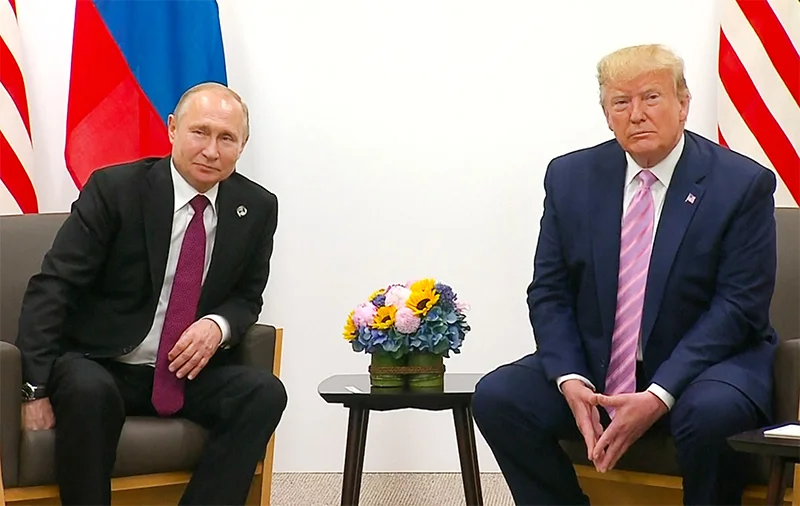
 It could be quite premature to claim that the US has closed ranks completely with the world’s foremost fascist states: Russia, China and North Korea. But there is no denying that the US is breaking with tradition and perceiving commonality of policy orientation with the mentioned authoritarian states of the East rather than with Europe and its major democracies at present.
It could be quite premature to claim that the US has closed ranks completely with the world’s foremost fascist states: Russia, China and North Korea. But there is no denying that the US is breaking with tradition and perceiving commonality of policy orientation with the mentioned authoritarian states of the East rather than with Europe and its major democracies at present.
Increasingly, it is seemingly becoming evident that the common characterization of the US as the ‘world’s mightiest democracy’, could be a gross misnomer. Moreover, the simple fact that the US is refraining from naming Russia as the aggressor in the Russia-Ukraine conflict and its refusal to perceive Ukraine’s sovereignty as having been violated by Russia, proves that US foreign policy is undergoing a substantive overhaul, as it were. In fact, one could not be faulted, given this backdrop, for seeing the US under President Donald Trump as compromising its democratic credentials very substantially.
Yet, it could be far too early to state that in the traditional East-West polarity in world politics, that the US is now squarely and conclusively with the Eastern camp that comprises in the main, China and Russia. At present, the US is adopting an arguably more nuanced approach to foreign policy formulation and the most recent UN Security Council resolution on Ukraine bears this out to a degree. For instance, the UN resolution in question reportedly ‘calls for a rapid end to the war without naming Russia as the aggressor.’
That is, the onus is being placed on only Ukraine to facilitate an end to the war, whereas Russia too has an obligation to do likewise. But it is plain that the US is reflecting an eagerness in such pronouncements to see an end to the Ukraine conflict. It is clearly not for a prolongation of the wasting war. It could be argued that a negotiated settlement is being given a try, despite current international polarizations.
However, the US could act constructively in the crisis by urging Russia as well to ensure an end to the conflict, now that there is some seemingly friendly rapport between Trump and Putin.
However, more fundamentally, if the US does not see Ukraine’s sovereignty as having been violated by Russia as a result of the latter’s invasion, we are having a situation wherein the fundamental tenets of International Law are going unrecognized by the US. That is, international disorder and lawlessness are being winked at by the US.
It follows that, right now, the US is in cahoots with those powers that are acting autocratically and arbitrarily in international politics rather than with the most democratically vibrant states of the West, although a facile lumping together of the US, Russia and China, is yet not possible.
It is primarily up to the US voting public to take clear cognizance of these developments, draw the necessary inferences and to act on them. Right now, nothing substantive could be done by the US voter to put things right, so to speak, since mid-term US elections are due only next year. But there is ample time for the voting public to put the correct perspective on these fast-breaking developments, internationally and domestically, and to put their vote to good use in upcoming polls and such like democratic exercises. They would be acting in the interest of democracy worldwide by doing so.
More specifically it is up to Donald Trump’s Republican voter base to see the damage that is being done by the present administration to the US’ standing as the ‘world’s mightiest democracy’. They need to bring pressure on Trump and his ‘inner cabinet’ to change course and restore the reputation of their country as the foremost democracy. In the absence of such action it is the US citizenry that would face the consequences of Trump’s policy indiscretions.
Meanwhile, the political Opposition in the US too needs to get its act together, so to speak, and pressure the Trump administration into doing what is needed to get the US back to the relevant policy track. Needless to say, the Democratic Party would need to lead from the front in these efforts.
While, in the foreign policy field the US under President Trump could be said to be acting with a degree of ambivalence and ambiguity currently, in the area of domestic policy it is making it all to plain that it intends to traverse a fascistic course. As has been proved over the past two months, white supremacy is being made the cardinal principle of domestic governance.
Trump has made it clear, for example, that his administration would be close to ethnic chauvinists, such as the controversial Ku Klux Klan, and religious extremists. By unceremoniously rolling back the ‘diversity programs’ that have hitherto helped define the political culture of the US, the Trump administration is making no bones of the fact that ethnic reconciliation would not be among the government’s priorities. The steady undermining of USAID and its main programs worldwide is sufficient proof of this. Thus the basis has been adequately established for the flourishing of fascism and authoritarianism.
Yet, the US currently reflects a complex awareness of foreign policy questions despite having the international community wondering whether it is sealing a permanent alliance with the main powers of the East. For instance, President Trump is currently in conversation on matters in the external relations sphere that are proving vital with the West’s principal leaders. For example, he has spoken to President Emmanuel Macron of France and is due to meet Prime Minister Keir Starmer of the UK.
Obviously, the US is aware that it cannot ‘go it alone’ in resolving currently outstanding issues in external relations, such as the Ukraine question. There is a clear recognition that the latter and many more issues require a collaborative approach.
Besides, the Trump administration realizes that it cannot pose as a ‘first among equals’, given the complexities at ground level. It sees that given the collective strength of the rest of the West that a joint approach to problem solving cannot be avoided. This is particularly so in the case of Ukraine.
The most major powers of the West are no ‘pushovers’ and Germany, under a possibly Christian Democratic Union-led alliance in the future, has indicated as much. It has already implied that it would not be playing second fiddle to the US. Accordingly, the US is likely to steer clear of simplistic thinking in the formulation of foreign policy, going forward.
Features
Clean Sri Lanka – hiccups and remedies
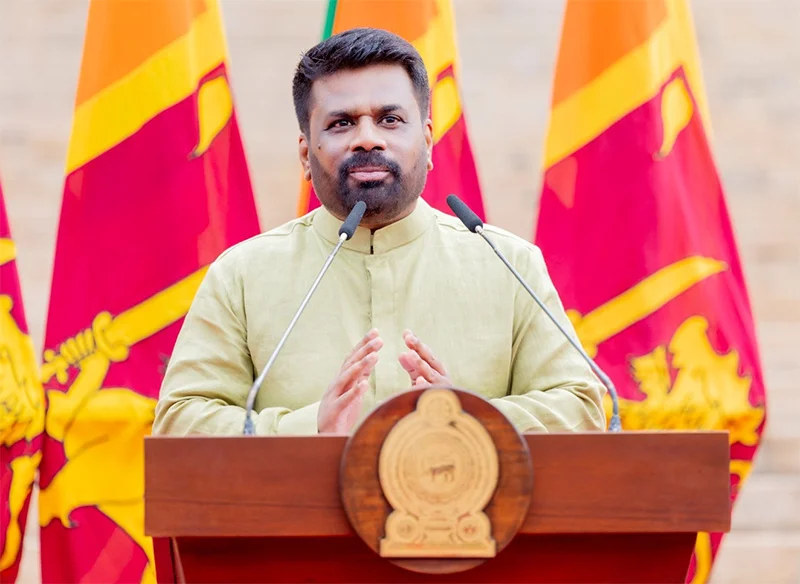
by Upali Gamakumara,
Upali.gamakumara@gmail.com
The Clean Sri Lanka (CSL) is a project for the true renaissance the NPP government launched, the success of which would gain world recognition. It is about more than just cleaning up places. Its broader objectives are to make places attractive and happy for people who visit or use services in the country, focusing more on the services in public institutions and organisations like the SLTB. Unfortunately, these broader objectives are not apparent in its theme, “Clean Sri Lanka,” and therefore there is a misconception that keeping the environment clean is the main focus.
People who realise the said broader objectives are excited about a cleaner Sri Lanka, hoping the President and the government will tackle this, the way they are planning to solve other big problems like the economy and poverty. However, they do not see themselves as part of the solution.
From the management perspective, the CSL has a strategic plan that is not declared in that manner. When looking at the government policies, one can perceive its presence, the vision being “A Prosperous Nation and a Beautiful Life,” the mission “Clean Sri Lanka” and the broader objectives “a disciplined society, effective services, and a cleaner environment.” If the government published these as the strategy, there would have been a better understanding.
Retaining the spirit and expectations and continuing the ‘Clean Sri Lanka’ project is equally important as much as understanding its deep idea. For this, it needs to motivate people, which differs from those motivators that people push to achieve selfish targets. The motivation we need here is to evolve something involuntarily, known as Drivers. Drivers push for the survival of the evolution or development of any entity. We see the absence of apparent Drivers in the CSL project as a weakness that leads to sporadic hiccups and free flow.
Drivers of Evolution
Drivers vary according to the nature of envisaged evolution for progress. However, we suggest that ‘the force that pushes anything to evolve’ would fit all evolutions. Some examples are: ‘Fitting to survival’ was the driver of the evolution of life. Magnetism is a driver for the unprecedented development of physics – young Einstein was driven to enquire about the ‘attraction’ of magnets, eventually making him the greatest scientist of the 20th century.
Leadership is a Driver. It is essential but do not push an evolution continually as they are not sprung within a system involuntarily. This is one of the reasons why CSL has lost the vigour it had at its inception.
CSL is a teamwork. It needs ‘Drives’ for cohesion and to push forward continually, like the Quality Improvement Project of the National Health Service (NHS) in England. Their drivers are outlined differently keeping Aims as their top driver and saying: Aims should be specific and measurable, not merely to “improve” or “reduce,” engage stakeholders to define the aim of the improvement project and a clear aim to identify outcome measures.
So, we think that CSL needs Aims as defined by NHS, built by stakeholder participation to help refine the project for continuous evolution. This approach is similar to Deming’s Cycle for continual improvement. Further, two more important drivers are needed for the CSL project. That is Attitudinal Change and Punishment. We shall discuss these in detail under Psychoactive Environment (pSE) below.
Aside from the above, Competition is another driver in the business world. This helps achieve CSL objectives in the private sector. We can see how this Driver pushes, with the spread of the Supermarket chains, the evolution of small and medium retail shops to supermarket level, and in the private banks and hospitals, achieving broader objectives of CSL; a cleaner environment, disciplined behaviuor, efficient service, and the instillation of ethics.
The readers can now understand the importance of Drivers pushing any project.
Three Types of Entities and Their Drives
We understand, that to do the transformation that CSL expects, we need to identify or adopt the drivers separately to suit the three types of entities we have in the country.
Type I entities are the independent entities that struggle for their existence and force them to adopt drivers involuntarily. They are private sector entities, and their drivers are the commitment of leadership and competition. These drivers spring up involuntarily within the entity.
Type II are the dependent entities. To spring up drivers of these entities commitment of an appointed trustee is a must. Mostly in state-owned entities, categorized as Boards, Authorities, Cooperations, and the like. Their drivers do not spring up within or involuntarily unless the leader initiates. The Government of a country also falls into this type and the emergence of drivers depends on the leader.
Type III entities have neither independent nor dependent immediate leader or trustee. They are mostly the so-called ‘Public’ places like public-toilets, public-playgrounds, and public-beaches. No team can be formed as these places are open to any, like no-man-land. Achieving CSL objectives at these entities depends on the discipline of the public or the users.
Clean Sri Lanka suffers the absence of drivers in the second and third types of entities, as the appointed persons are not trustees but temporary custodians.
The writer proposes a remedy to the last two types of entities based on the theory of pSE explained below.
Psychoactive Environment (pSE) –
The Power of Customer Attraction
Research by the writer introduced the Psychoactive Environment (pSE) concept to explain why some businesses attract more customers than others who provide the same service. Presented at the 5th Global Conference on Business and Economics at Cambridge University in 2006, the study revealed that a “vibe” influences customer attraction. This vibe, termed pSE, depends on Three Distinct Elements, which can either attract or repel customers. A positive pSE makes a business more attractive and welcoming. This concept can help develop Drivers for Type II and III entities.
pSE is not an all-inclusive solution for CSL, but it lays the foundation for building Drivers and motivating entities to keep entrants attractive and contented.
The structure of the pSE
The three distinct Elements are the Occupants, Systems, and Environment responsible for making a pSE attractive to any entity, be it a person, institution, organization, or county. Each of these elements bears three qualities named Captivators. These captivators are, in simple terms, Intelligent, Nice, and Active in their adjective forms.
pSE theorizes that if any element fails to captivate the entrant’s mood by not being Intelligent, Nice, or Active, the pSE becomes negative, repelling the entrant (customer). Conversely, the positive pSE attracts the entrants if the elements are Intelligent, Nice, and Active.
For example, think person who comes to a Government Office for some service. He sees that the employees, service, and environment are intelligent, nice, and active, and he will be delighted and contented. He will not get frustrated or have any deterioration in national productivity.
The Significance of pSE in CSL
The Elements and the Captivators are universal for any entity. Any entity can easily find its path to Evolution or Progress determined by these elements and captivators. The intangible broader objectives can be downsised to manageable targets by pSE. Achievements of these targets make the entrants happy and enhance productivity – the expectation of Clean Sri Lanka (CSL).
From the perspective of pSE, now we can redefine the Clean Sri Lanka project thus:
To make the Elements of every entity in Sri Lanka: intelligent, Nice, and Active.
How Would the pSE be A Remedy for The Sporadic Hiccups?
We have seen two possible reasons for sporadic setbacks and the discontinuity of some projects launched by the CSL. They are:
The absence of involuntary Drivers for evolvement or progress
Poor attitudes and behaviors of people and leaders
Remedy for the Absence of Drivers
Setting up a system to measure customer or beneficiary satisfaction, and setting aims can build Drivers. The East London NHS principles help build the Aims that drive type II & II entities. The system must be designed to ensure continual improvement following the Deming Cycle. This strategy will create Drivers for Type I & II entities.
This process is too long to explain here therefore we refrain from detailing.
Attitudinal Change
The most difficult task is the attitudinal and behavioural change. Yet it cannot be postponed.
Punishment as a strategy
In developed countries, we see that people are much more disciplined than in the developing countries. We in developing countries, give credit to their superior culture, mitigating ours as rudimental. The long experience and looking at this affair from a vantage point, one will understand it is not the absolute truth. Their ruthless wars in the past, rules, and severe punishment are the reasons behind this discipline. For example, anyone who fails to wear a car seatbelt properly will be fined 400 AUD, nearly 80,000 LKR!
The lesson we can learn is, that in Sri Lanka, we need strong laws and strict punishment together with a type of strategic education as follows.
Psychological Approach as a Strategy
The psychological theory of attitude formation can be used successfully if some good programmes can be designed.
All attitude formations start with life experience. Formed wrong or negative attitudes can be reversed or instilled with correct attitudes by exposure to designed life experiences. The programmes have been developed using the concepts of Hoshin Kanri, Brainstorming, Cause-and-Effect analysis, and Teamwork, in addition to London NTS Quality Improvement strategies.
The experience and good responses we received for our pSE programs conducted at several institutions prove and have built confidence in our approach. However, it was a time, when governments or organisations did not pay much attention to cultural change as CSL expects in the country.
Therefore, we believe this is a golden opportunity to take the CSL supported by the pSE concept.
Features
Visually impaired but ready to do it their way
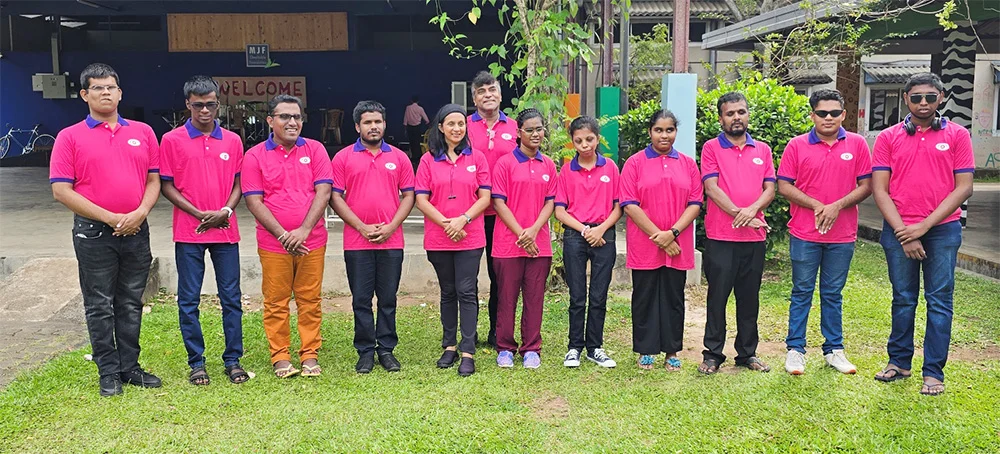
 Although they are visually impaired youngsters, under the guidance of renowned musician Melantha Perera, these talented individuals do shine bright … hence the name Bright Light.
Although they are visually impaired youngsters, under the guidance of renowned musician Melantha Perera, these talented individuals do shine bright … hence the name Bright Light.
Says Melantha: “My primary mission is to nurture their talent and ensure their sustainable growth in music, and I’m thrilled to announce that Bright Light’s first public performance is scheduled for 7th June, 2025. The venue will be the MJF Centre Auditorium in Katubadda, Moratuwa.”
Melantha went on to say that two years of teaching, online, visually impaired youngsters, from various parts of the island, wasn’t an easy ride.
There were many ups and downs but Melantha’s determination has paid off with the forming of Bright Light, and now they are gearing up to go on stage.
According to Melantha, they have come a long way in music.
“For the past few months, we have been meeting, physically, where I guide them to play as a band and now they show a very keen interest as they are getting to the depth of it. They were not exposed to English songs, but I’ve added a few English songs to widen their repertoire.
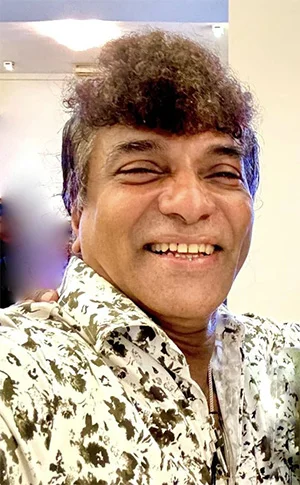
Melantha Perera: Invented a notation
system for the guitar
“On 7th June, we are opening up for the public to come and witness their talents, and I want to take this product island-wide, giving the message that we can do it, and I’m hoping to create a database so there will be a following. Initially, we would like your support by attending the show.”
Melantha says he didn’t know what he was getting into but he had confidence teaching anyone music since he has been in the scene for the past 45 years. He began teaching in 2015,
“When I opened my music school, Riversheen School of Music, the most challenging part of teaching was correcting tone deaf which is the theoretical term for those who can’t pitch a note, and also teaching students to keep timing while they sang and played.”
Melantha has even invented a notation system for the guitar which he has named ‘MelaNota’. He has received copyrights from the USA and ISO from Australia, but is yet to be recognised in Sri Lanka.
During Covid-19, Melantha showcased MelaNota online and then it was officially launched with the late Desmond De Silva playing one of his tunes, using MelaNota.
Melantha says that anyone, including the visually impaired, can play a simple melody on a guitar, within five minutes, using his notation system.
“I’ve completed the system and I’m now finalising the syllabus for the notation system.”
Melantha has written not only for the guitar, but also for drums, keyboards, and wind instruments.
For any queries, or additional information, you could contact Melantha at 071 454 4092 or via email at thebandbrightlight@gmail.com.
-

 Business3 days ago
Business3 days agoSri Lanka’s 1st Culinary Studio opened by The Hungryislander
-

 Sports4 days ago
Sports4 days agoHow Sri Lanka fumbled their Champions Trophy spot
-
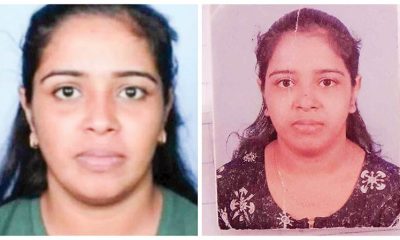
 News6 days ago
News6 days agoKiller made three overseas calls while fleeing
-

 News5 days ago
News5 days agoSC notices Power Minister and several others over FR petition alleging govt. set to incur loss exceeding Rs 3bn due to irregular tender
-

 Features4 days ago
Features4 days agoThe Murder of a Journalist
-
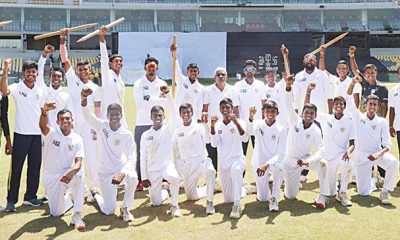
 Sports4 days ago
Sports4 days agoMahinda earn long awaited Tier ‘A’ promotion
-
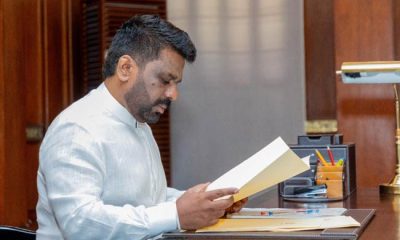
 Features4 days ago
Features4 days agoExcellent Budget by AKD, NPP Inexperience is the Government’s Enemy
-

 News5 days ago
News5 days agoMobile number portability to be introduced in June

